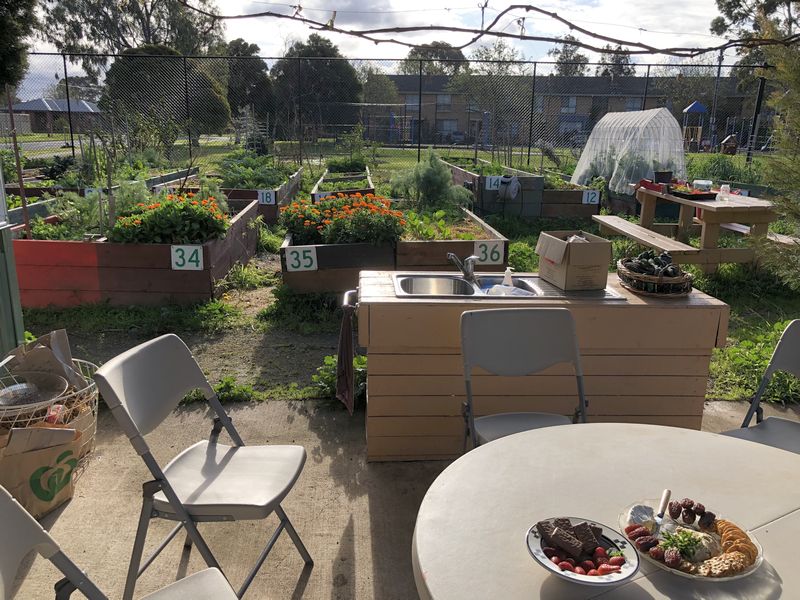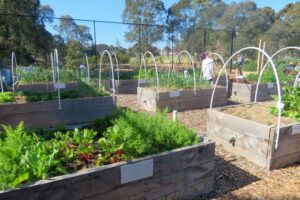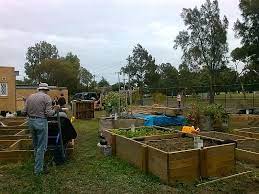
Banyule is a diverse community facing challenges of food insecurity and social inequalities, exacerbated by the COVID-19 pandemic and cost of living pressures.
In response, Banyule City Council partnered with Sustain: The Australian Food Network to develop their first Urban Food Strategy aiming to create a healthy, sustainable, and equitable urban food system that fosters community connection, resilience and addresses climate change.

Between October 2022 and March 2023, over 700 community members engaged in community pop ups, kitchen table events, workshops, surveys, and focus groups to shape the draft Urban Food Strategy and Action Plan. The community’s insights highlighted the need to strengthen local food systems, promote collaboration, and ensure access to healthy and culturally appropriate food.
Currently in the stages of inviting feedback, the Urban Food Strategy revolves around five key themes and eighteen objectives:
Theme 1: An inclusive, connected food community
Objective 1: Strengthen dignified access to good food across the community
Objective 2: Celebrate and connect the community through food
Objective 3: Strengthen connections and participation across the community food sector
Objective 4: Prioritise First Nations foodways and connection to Country
This theme focuses on ensuring equitable access to good food for all residents and addressing food insecurity. It also aims to use food as a tool for community connection and celebration of diverse food cultures.
Theme 2: A thriving local food economy
Objective 5: Support greater access to Victorian food and shorter supply chains
Objective 6: Support and diversify Banyule’s local food economy
Objective 7: Encourage a vibrant, skilled, and sustainable food sector
The second theme centres around fostering a thriving local food economy by supporting local food businesses, providing job opportunities, and promoting the purchase of local food within Banyule. It also aims to create connections between the food sector and other growth sectors in the region.
Theme 3: Planning for healthy and sustainable food systems
Objective 8: Co-design neighbourhood food retailing environments with the local community
Objective 9: Integrate food into planning to support residents’ access to fresh produce and affordable local food

Objective 10: Create healthy food environments in Council-owned facilities and other institutions and workplaces
Objective 11: Reduce the ecological impact of the local food system
This theme emphasizes the importance of incorporating healthy and sustainable food environments into the local planning scheme, ensuring access to affordable and culturally appropriate food options, and reducing the environmental impact of the food system.
Theme 4: Abundant edible landscapes
Objective 12: Expand access to edible food spaces
Objective 13: Empower the community to grow, cook, preserve, and share food and food knowledge
Objective 14: Support local and regional food production
The fourth theme promotes the cultivation of edible landscapes and supports urban agriculture and gardening initiatives, with the goal of improving dietary, physical, and mental health and contributing to climate change action.
Theme 5: Good food system governance
Objective 15: Demonstrate strong leadership support and engagement
Objective 16: Engage in collaborative governance and coordination with community members
Objective 17: Enable policy integration and cohesion through a whole of council approach
Objective 18: Ensure effective resourcing and investment
The final theme highlights the importance of good food system governance, which involves strong leadership support, collaborative decision-making, policy integration, and effective allocation of resources to implement the strategy.
Banyule’s Urban Food Strategy Action Plan outlines key actions for the next four years and includes indicators, targets, and data sources for progress tracking. Annual reviews will involve relevant stakeholders, and at the end of the four-year period, a comprehensive evaluation framework will assess the strategy’s outcomes and impacts.
Banyule envisions an urban food system that provides equitable access to good food, celebrates diversity, and connects the community through thriving local food economies and abundant edible landscapes. Inclusiveness, collaboration, and participatory decision-making will lead the way to a sustainable and vibrant food future for Banyule contributing to the broader vision of a healthy, regenerative, and equitable food system in Victoria.